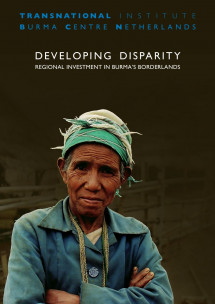Developing Disparity Regional Investment in Burma’s Borderlands
Topics
Regions
Unless foreign direct investment in Burma's war-torn borderlands is refocused towards people-centered development, it is likely to deepen disparity between the region’s most neglected peoples and Burma's new military, business and political elite and exacerbate a decades-long civil war.

Authors
Burma has entered a pivotal stage in its political and economic development. The advent of a new quasi-civilian government has raised the prospect of fundamental reforms. this has sparked great investment interest among governments and the private sector in the region and beyond, to extract the country’s natural-resource wealth, and to develop large-scale infrastructure projects to establish strategic ‘corridors’ to connect Burma to the wider economic region.the country is touted as asia’s “final frontier” for resources and investment and as asia’s next “economic tiger”.
These large-scale investment projects focus on the borderlands, where most of the natural resources in Burma are found. These areas are home to poor and often marginalised ethnic minority groups, and have been at the centre of more than 60 years of civil war in Burma – the longest running in the world. These war-torn borderlands are now in the international spotlight as regions of great potential but continuing poverty and grave humanitarian concern.
Such investment is not conflict-neutral and has in some cases fuelled local grievances and stimulated ethnic conflict. Economic grievances among ethnic groups – often tied to resources being extracted from the borderlands to sustain the government and business elites – have played a central part in fuelling the civil war.
While regional investment could potentially foster economic growth and improve people’s livelihoods, the country has yet to develop the institutional and governance capacity to manage the expected windfall. Burma is emerging from decades under military rule, and the foreign-funded mega projects have not, to date, benefited local communities. land-grabbing has increased, and the recent economic laws and new urban wealth have not brought about tangible improvements for the poor.
If local communities are to benefit from the reforms, there need to be new types of investment and processes of implementation. The government should direct investment towards people-centred de- velopment that benefits household economies.there is a need to resolve conflict through dialogue and reconciliation. These are the hallmarks of a robust and healthy democracy. In their absence, the development of asia’s final frontier will only deepen disparity between the region’s most neglected peoples and the new military, business and political elites whose wealth is rapidly increasing.

